Filter 815 resources:
- ai (358)
- llm (110)
- science (89)
- blockchain (62)
- media (56)
- chatgpt (50)
- semantic (49)
- social media (47)
- digital transformation (47)
- machine learning (37)
- disinformation (37)
- news (35)
- science communication (34)
- open web (32)
- autonomous (32)
- innovation (31)
- community (31)
- taxibot (30)
- tool (30)
- bot (27)
- augmented reality (26)
- psychology (25)
- myhub (25)
- journalism (24)
- algorithm (24)
- productivity (23)
- facebook (23)
- technology (22)
- creativity (22)
- open source (22)
- newsletter (21)
- curation (21)
- filter bubble (20)
- transport (20)
- web (20)
- data (20)
- privacy (19)
- ai4communities (18)
- knowledge management (18)
- science journalism (17)
- bloggingportal (17)
- bluesky (16)
- virtual reality (16)
- google (16)
- eu (15)
- nlp (15)
- ai prompt (15)
- storytelling (14)
- big data (14)
- gpt-x (13)
- design (13)
- content strategy (13)
- dao (13)
- management (13)
- strategy (12)
- video (12)
- covid19 (12)
- platform (12)
- publicsphere (12)
- ethics (12)
- trust (12)
- twitter (12)
- atprotocol (11)
- identity (11)
- collective intelligence (11)
- communications (11)
- cognitive (11)
- machine translation (10)
- fediverse (10)
- audience research (10)
- regulation (10)
- guide (9)
- evidence-based policy (9)
- search (9)
- comments (9)
- bitcoin (9)
- k4p (8)
- centaur (8)
- ai-agent-gpt (8)
- troll (8)
- multilingualism (8)
- politics (8)
- api (8)
- automation (8)
- online architecture (8)
- ethereum (8)
- climate (7)
- car (7)
- drupal (7)
- egovernment (7)
- chat (7)
- business model (7)
- ux (7)
- ethan mollick (7)
- blogging (7)
- visualisation (7)
- ai search (6)
- participation (6)
- future (6)
- change (6)
- trump (6)
- training (6)
- agile (6)
- sceptic (6)
- intro (6)
- democracy (6)
- model collapse (6)
- 2ndbrain (6)
- bullshit (6)
- network theory (6)
- gds (6)
- philosophy (6)
- longform (6)
- experiment (6)
- analytics (6)
- event (6)
- medium (6)
- risk (6)
- information (5)
- software (5)
- content (5)
- mobile (5)
- open science (5)
- us (5)
- iot (5)
- inscrutable (5)
- copyright (5)
- cms (5)
- culture (5)
- open data (5)
- policy (5)
- gender (5)
- publishing (5)
- society (5)
- sublime (5)
- rag (5)
- data visualisation (5)
- organisation (5)
- city (5)
- moderation (5)
- futurism (5)
- us2020 (5)
- post-truth (4)
- ocm (4)
- faq (4)
- nytimes (4)
- knowledge graph (4)
- mastodon (4)
- crowdsourcing (4)
- peakbot (4)
- seo (4)
- cryptocurrency 2.0 (4)
- conspiracy (4)
- hr (4)
- mybot (4)
- authenticity (4)
- compositional (4)
- bubble (4)
- autogpt (4)
- surveillance (4)
- embedding (4)
- langchain (4)
- ec (4)
- framework (4)
- backfire effect (4)
- disruption (4)
- synthesise (4)
- censorship (4)
- hate (4)
- botshit (4)
- understanding (4)
- startup (4)
- evolution (4)
- cory doctorow (4)
- obsidian (4)
- internal communications (4)
- partisan (4)
- polarization (4)
- deep fake (4)
- linkedin (4)
- machine text (4)
- transparency (4)
- education (4)
- writing (4)
- bias (4)
- leadership (4)
- perplexity.ai (4)
- metrics (4)
- native advertising (4)
- decentralised (4)
- responsive (3)
- interactive (3)
- enewsletter (3)
- publicsector (3)
- podcast (3)
- quantum (3)
- html5 (3)
- 360video (3)
- chatbot (3)
- scicomm (3)
- factchecking (3)
- economy (3)
- biology (3)
- marketing (3)
- ideation (3)
- antivaxxer (3)
- propaganda (3)
- research (3)
- tribe (3)
- physics (3)
- use case (3)
- solid (3)
- discourse (3)
- amp (3)
- tools (3)
- audiovisual (3)
- bloggingportal2 (3)
- euractiv (3)
- mixed reality (3)
- note (3)
- data enrichment (3)
- yanss (3)
- betaworx (3)
- web design (3)
- gordon brander (3)
- datamining (3)
- autosummarise (3)
- smartcities (3)
- china (3)
- llama (3)
- agent (3)
- tag (3)
- assistant (3)
- meta (3)
- humour (3)
- harpa (3)
- persuasion (3)
- douglas rushkoff (3)
- nostr (3)
- government (3)
- sari azout (3)
- project management (3)
- notebooklm (3)
- narratives (3)
- casey newton (3)
- bandwagon (3)
- p2p (3)
- optimisation (3)
- survey (3)
- atprotocol lexicon (3)
- open government (3)
- altmetric (3)
- content marketing (3)
- conference report (2)
- attentionweb (2)
- network (2)
- blog (2)
- ontology (2)
- knowledge visualisation (2)
- web3 (2)
- web2.0 (2)
- defi (2)
- nft (2)
- syndicated-translation (2)
- voice (2)
- basic (2)
- nasa (2)
- slack (2)
- signal2noise (2)
- jeff jarvis (2)
- context (2)
- atproto adoption (2)
- fomo (2)
- language (2)
- web20 (2)
- truth (2)
- brexit (2)
- logistics (2)
- mental health (2)
- token (2)
- enshittification (2)
- tv (2)
- tourism (2)
- sensemaking (2)
- game theory (2)
- google assistant (2)
- gpt-4o (2)
- emotion (2)
- atconnect (2)
- diversity (2)
- dissonance (2)
- sovereignty (2)
- echo chamber (2)
- coach (2)
- cities (2)
- animation (2)
- internet of things (2)
- empathy (2)
- security (2)
- art (2)
- roamresearch (2)
- visual (2)
- fascism (2)
- roi (2)
- law (2)
- expert (2)
- antitrust (2)
- consultancy (2)
- indieweb (2)
- uber (2)
- mindfulness (2)
- ibm (2)
- reddit (2)
- ipr (2)
- smart contract (2)
- pilot (2)
- claude code (2)
- programme (2)
- brave (2)
- opencalais (2)
- spambot (2)
- values (2)
- maths (2)
- data journalism (2)
- language technology (2)
- curatorbot (2)
- governance (2)
- top3pods (2)
- healthcare (2)
- web development (2)
- advertising (2)
- social (2)
- usa (2)
- alignment (2)
- code interpreter (2)
- plugin (2)
- safety (2)
- bloom (2)
- apple (2)
- cx (2)
- emily m bender (2)
- startupy (2)
- instant articles (2)
- ted chiang (2)
- ai-image (2)
- openai (2)
- wordpress (2)
- adblock (2)
- messaging (2)
- psychometrics (2)
- commoditisation (1)
- napkin ai (1)
- will storr (1)
- richard dawkins (1)
- dopamine (1)
- idpi (1)
- membrain (1)
- grift (1)
- ludicity (1)
- nature magazine (1)
- ourobouros (1)
- capacities (1)
- ghostreader (1)
- embodiment (1)
- anthropomorphic (1)
- chinese room (1)
- anthropocentric (1)
- spotify (1)
- reversal curse (1)
- hubspot (1)
- llmo (1)
- false memory (1)
- o1 (1)
- extraheric (1)
- bluesky custom feeds (1)
- unfinished (1)
- whitewind (1)
- blacksky (1)
- detect (1)
- open social (1)
- groundmist (1)
- grjte (1)
- leaflet (1)
- fair (1)
- ronen tamari (1)
- eurosky (1)
- ai psychosis (1)
- cosmik (1)
- kuhn (1)
- barry prendergast (1)
- ai reasoning (1)
- simon willison (1)
- gas town (1)
- standard.site (1)
- damien van achter (1)
- dries buytaert (1)
- procurement (1)
- horizonprogramme (1)
- morality (1)
- humility (1)
- promotion (1)
- cmv (1)
- collaboration (1)
- groupthink (1)
- explainer (1)
- minimalist (1)
- populism (1)
- hype (1)
- ui (1)
- liberalism (1)
- network effect (1)
- business (1)
- compass news (1)
- journal (1)
- cambridge analytica (1)
- nudge (1)
- behaviour (1)
- atomisation (1)
- po.et (1)
- infowar (1)
- computational propaganda (1)
- steem (1)
- memory (1)
- process (1)
- fakebox (1)
- overfitting (1)
- wikipedia (1)
- digital (1)
- bbc (1)
- gamification (1)
- expertise (1)
- ubi (1)
- purpose (1)
- design thinking (1)
- salesforce (1)
- ibm watson (1)
- happiness (1)
- debunk (1)
- ewrc2017 (1)
- insurge (1)
- mobocracy (1)
- hashgraph (1)
- block (1)
- honesty (1)
- motivated (1)
- dunning-kruger (1)
- newsroom (1)
- engagement (1)
- team (1)
- storyline (1)
- tumblr (1)
- free (1)
- fractal (1)
- consciousness (1)
- snapchat (1)
- local (1)
- scrollytelling (1)
- sparse data (1)
- remote (1)
- jobtodo (1)
- customer support (1)
- complex (1)
- film (1)
- edelman (1)
- immigration (1)
- uk (1)
- gravity (1)
- blogpocalypse (1)
- competition (1)
- health (1)
- deadbot (1)
- conversation (1)
- vr (1)
- magazine (1)
- impact (1)
- vox (1)
- telegram (1)
- singularity (1)
- persona (1)
- resources (1)
- liquid democracy (1)
- app (1)
- integrated (1)
- headline (1)
- jelly (1)
- micro-moment (1)
- medicine (1)
- fintech (1)
- intranet (1)
- apple news (1)
- signaltonoise (1)
- mooc (1)
- membership (1)
- vine (1)
- radio (1)
- music (1)
- insurance (1)
- text (1)
- bestof2015 (1)
- europe (1)
- open ledger project (1)
- longreads (1)
- statistics (1)
- farm (1)
- agriculture (1)
- spain (1)
- inequality (1)
- meaning (1)
- europcom (1)
- editorial (1)
- buffer (1)
- augmented intelligence (1)
- rss (1)
- ios (1)
- finance (1)
- image (1)
- brainstorming (1)
- seenthis (1)
- gmo (1)
- economics (1)
- networking (1)
- bioethics (1)
- publication (1)
- genetic (1)
- humanity (1)
- air (1)
- australia (1)
- corruption (1)
- cancer (1)
- gov2.0 (1)
- electric vehicle (1)
- traffic (1)
- aggrefilter (1)
- css (1)
- europa (1)
- amazon (1)
- multitasking (1)
- example (1)
- scraping (1)
- intelligence (1)
- sidechain (1)
- blockstream (1)
- hive (1)
- virtual (1)
- planning (1)
- hbr (1)
- eptv (1)
- ntopic (1)
- yahoo (1)
- campaign (1)
- kpi (1)
- portal (1)
- happeningo (1)
- calendar (1)
- paradigm (1)
- archive (1)
- wayback (1)
- taxonomy (1)
- rdf (1)
- linked data (1)
- database (1)
- excel (1)
- ecas (1)
- register (1)
- adaptive (1)
- liquid (1)
- python (1)
- open access (1)
- geo (1)
- faceted search (1)
- kickstarter (1)
- nfc (1)
- ibeacon (1)
- convert (1)
- cro (1)
- game (1)
- customers (1)
- pinterest (1)
- belgium (1)
- information architecture (1)
- blogactiv (1)
- employee engagement (1)
- messenger (1)
- learn (1)
- primal (1)
- stanbol (1)
- apache (1)
- multisite (1)
- rationalisation (1)
- brussels bubble (1)
- eureka (1)
- ip (1)
- ltinnovate2016 (1)
- visualization (1)
- google glass (1)
- data void (1)
- hololens (1)
- employeeengagement (1)
- evidence (1)
- word2vec (1)
- liability (1)
- annotate (1)
- solr (1)
- selfish (1)
- posse (1)
- gdpr (1)
- dissemination (1)
- interoperability (1)
- post-alpha (1)
- saas (1)
- neural link (1)
- quantum computing (1)
- blackpr (1)
- balance (1)
- threadapalooza (1)
- gatsby (1)
- substack (1)
- geoengineer (1)
- curiosity (1)
- nz (1)
- syllabus (1)
- programming (1)
- rail (1)
- intuition (1)
- imposter syndrome (1)
- zettelkasten (1)
- unreality (1)
- critical theory (1)
- woke (1)
- delegitimise (1)
- pink slime (1)
- activitypub (1)
- flicc (1)
- filecoin (1)
- early adopter (1)
- bridge (1)
- bridgit (1)
- tiktok (1)
- personal (1)
- ghost (1)
- myanmar (1)
- metaverse (1)
- flipboard (1)
- presidency (1)
- urbit (1)
- andy matuschak (1)
- blogtour (1)
- semanticweb (1)
- bxlsbbl (1)
- euractiv-com (1)
- specialised (1)
- life-in-belgium (1)
- hungarian (1)
- accreditation (1)
- eparticipation (1)
- robot (1)
- notion (1)
- generative art (1)
- fwb (1)
- cooperatives (1)
- snapshot (1)
- multisig (1)
- d2d (1)
- moloch (1)
- glossary (1)
- oracle (1)
- chainlink (1)
- elon musk (1)
- pkm (1)
- procrastination (1)
- 3p framework (1)
- pkgbook (1)
- subconscious (1)
- readwise (1)
- myhub pinboard (1)
- plexus (1)
- scaling synthesis (1)
- ma parent (1)
- maestro app (1)
- gems app (1)
- sane app (1)
- answer engine (1)
- custom search (1)
- lexii.ai (1)
- digital garden (1)
- dark forest web (1)
- data union (1)
- disco (1)
- binggpt (1)
- mermaid (1)
- noam chomsky (1)
- stochastic parrot (1)
- christopher manning (1)
- llamaindex (1)
- bingchat (1)
- alpca (1)
- miro (1)
- vector database (1)
- cloud (1)
- prompt engineering (1)
- streamlit (1)
- chameleon (1)
- sales (1)
- tailwind (1)
- bard (1)
- specification gaming (1)
- alphafold (1)
- human (1)
- reinforcement learning (1)
- recursion (1)
- deep learning (1)
- llama2 (1)
- ezra klein (1)
- data analysis (1)
- guardrail (1)
- evgeny morozov (1)
- agi (1)
- custom instructions (1)
- persona prompt (1)
- giannigiacomelli (1)
- myhub chat (1)
- dall-e3 (1)
- adobe (1)
- quality (1)
- boston consulting group (1)
- jagged frontier (1)
- cyborg (1)
- autogen (1)
- fraud (1)
- reference frame (1)
- bedrock (1)
- ai-vision (1)
- questy (1)
- fastlane (1)
- faiss (1)
- threads (1)
- smart connections (1)
- mixture of experts (1)
- mistral (1)
- alan blackwell (1)
- criti-hype (1)
- joan westenberg (1)
- overview (1)
- meaning alignment institute (1)
- sift (1)
- course (1)
- o'reilly (1)
Relevant Overviews
- Communication Strategy
- Content Strategy
- Online Strategy
- Online Community Management
- Social Media Strategy
- Content Creation & Marketing
- Online Architecture
- Digital Transformation
- Change & Project Management
- Blockchain, Crypto, NFTs etc
- Innovation Strategy
- Communications Tactics
- Social Web
- Media
- Politics
- Communications Strategy
- Science&Technology
- Business
Overview: Science&Technology
Relevant resources
'Innovation' threaded its way through a lot of the resources added to my TumblrHub last week: from innovation-friendly management through to innovative Content Management Systems for tomorrow's newsmedia business models and personal productivity tools.
"an interesting glimpse at the technology responsible for publishing 700 articles, 600 images, 14 slideshows, and 50 videos on a daily basis." I find the article fascinating because of what the CMS is not - it: "does not render our website or provide community tools to our readers. Rather, it is a system for managing content and publishing d…
One for @richardmedic ... "Smydra ... he wants to find a way to allow the public to benefit from all the knowledge of future news events locked up inside newsrooms.... He'd love your thoughts" - Can you turn future news events into structured data? » Nieman Journalism Lab

"marketers need to shift their SEO strategies to focus on user intent rather than keywords ... will have to consider their information architecture and the relationship between sections of their websites in relation to the intent of web users (i.e. is the search navigational, informational or transactional?) in order to deliver the most valuable c…
Aug(De)Mented Reality- deliriously wonderful!
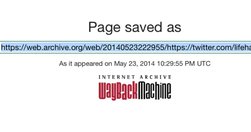
Useful trick to document your website's evolution: "Head on over to the Wayback machine and choose the Save Page Now option. It doesn't work on all sites, but if you want to capture content that might change, you can add a page directly to the archive and get a custom URL for it. If the link is a PDF, it will capture that as well." I just archiv…
"technology is the easy part ... cultural and political—those are your two big barriers. And they’re sort of tied together.... ... a lot of people go off the rails ... dictate solutions without any understanding of the on-the-ground realities of the agencies doing the work. " - Learning from New York City’s open-data effort | McKinsey & Company
The Horror! The Horror! - Enquête de la Commission européenne Survey
More titbits from that internal NYT digital report: "There are about 14.7 million articles in the Times’ archives back to 1851 ... We can be both a daily newsletter and a library — offering news every day, as well as providing context, relevance and timeless works of journalism.” " - The leaked New York Times innovation report is one of the key d…
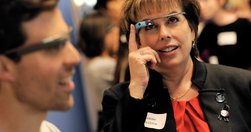
Start preparing your content now... "Context-aware software for smartphones is all the rage ... Twitter bought Android home screen startup Cover, Apple bought smart assistant Cue, Yahoo bought Cover competitor Aviate, and of course Google pioneered the field ... with its Google Now service." - This is what comes after search – Quartz Combined w…
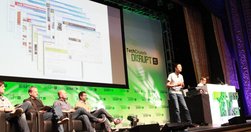
"you could call this a “decision engine” ... Vurb’s goal is to dig actionable information out and present it all on the same page. " - Vurb’s Contextual Search Engine Blows Away Those Stupid Lists Of Links | TechCrunch I wrote years ago of the power the semantic web offers EC programmes, who should be able to get their beneficiaries to publish t…

The mind boggles ... "perhaps the creepiest outgrowth of cryptocurrency 2.0: distributed autonomous organizations, or DAOs. Based on charters taking the form of code on a peer-to-peer network, these are entities that could automate many of the tasks of a conventional organization with varying levels of human input. For instance, a DAO could act d…
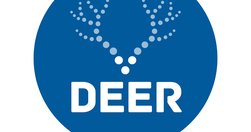
"Triplify tackles the chicken-and-egg problem of the Semantic Web by providing a building block for the “semantification” of Web applications. Triplify provides small, light-weight plugins for database-backed Web applications and exposes semantics as RDF, Linked Data and JSON"
experimenting with this for the bloggingportal reboot
"...is a powerful tool for working with messy data: cleaning it; transforming it from one format into another; extending it with web services; and linking it to databases like Freebase."

" If we wanted more email subscribers, we’d have to make it easier for people to subscribe." Quartz's new approach to enewslettre subscription, which has seen daily subscriber rates double since February, is like the 'Quick Subscribe' feature I always propose for online community sites: - some users may create an account to subscribe, but most wo…

And not just journalists. New generation news sites are redefining news and, by consequence, rethinking information architecture, content strategy and CMS. I only hope the results filter through to everyone else, and sooner rather than later. "... a moment when young talent began demanding superior technology as the key to producing superior jour…
A new generation of companies, like CIRCA, are redefining the structure of how information is treated, and building new CMS to support it. Their approach will inevitably feed into a new generation of CMS for whom the 'article' and 'page' are, if not meaningless, at least optional. And I for one can't wait. "what we’re really doing at Circa is a…
Why does this brilliant video remind me of the preponderance of arts graduates in the #bxlsbbl?It’s really worth a look. And then another one. The acting here is actually superb. Watch the Expert’s expression run the gamut from shock to resignation in just a few minutes! (that one took me 20 years…)- via LaughingSquid: The Expert, A Hilarious Sket…
Perils and pitfalls of augmented reality …
Excellent tool for explaining "the difference between Adaptive, Responsive, Static and Liquid sites ..." - Liquidapsive (Liqui-dap-sive)
Surprised that after a week this only has about 500 views. Vox.com should be one of the top tech-first news innovators to watch this year
"The multiverse may even help explain one of the more vexing paradoxes about our world, sometimes called the "anthropic" principle: the fact that we are here to observe it." - Big Bang Discovery Opens Doors to the "Multiverse"
Well, plus ca change - absolutely none of the things some BloggingPortal editors said we'd do after our meeting in January have been done, apart from our own posts and what Stefan did, which is ironic given that he told us he had no time to do anything.

Interesting perspective on the rash of new tech-content hybrids emerging in the media space. Back in the day, companies could be either tech or content, but not both: "What were you going to be really good at? Engineering or “content”? You couldn’t do both, because that would mean that one would be subordinate to the other. And if you were going…

Nice animation about the uncertainty principle, although it’s not mentioned by name, confirmngi the theory that chemistry is what’s left when the physicists have figured everything interesting out ;)
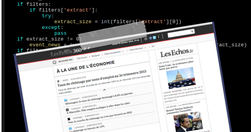
Les Echos looks to be doing what I have long dreamed to do for the bloggingportal reboot - deploy semantic analysis to aid content discovery and to underpin a new wave of media and comment. But do we have to call it an 'aggrefilter'? "Les Echos launches its business news aggrefilter ... to gain critical working knowledge of the semantic web." …
Nice NYTimes tour of the current news startup wave: Key point: "quality, customized advertising on sites with good editorial content was actually a solid business with growing margins... Business Insider has had nine consecutive quarters where the revenue per page was rising.... “There are fundamental secular trends — ad growth, mobile growth, pa…

"the International Barcode of Life (iBOL), a consortium of universities, natural history museums and research institutes, are asking people around the world to gather samples. Then, back in their labs, scientists can identify the species by sequencing a section of its DNA" - IBM and SAP open up big data platforms for citizen science | Guardian Su…

Medium on how magazine editing is morphing as technology transforms online longform: "Online, each story is at best its own magazine, sent out to find its own temporary audience. One article may absorb people who subscribe, or would once have subscribed, to Foreign Affairs; another might absorb devotees of Wired or Men’s Health or Glamour. The au…
Loading more...
Relevant Overviews
- Communication Strategy
- Content Strategy
- Online Strategy
- Online Community Management
- Social Media Strategy
- Content Creation & Marketing
- Online Architecture
- Digital Transformation
- Change & Project Management
- Blockchain, Crypto, NFTs etc
- Innovation Strategy
- Communications Tactics
- Social Web
- Media
- Politics
- Communications Strategy
- Science&Technology
- Business